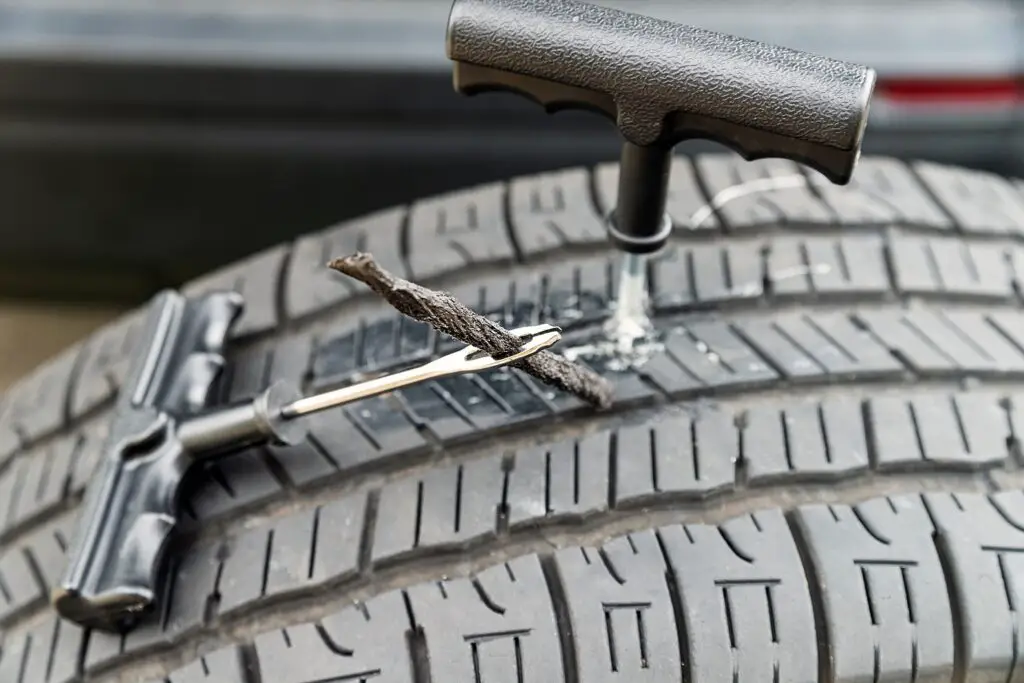Tire plugs are legal for small tread punctures if they follow safety and local regulations. They’re unsuitable for sidewalls or large damage and work best as temporary fixes or with professional plug-patch repairs.
Tire repair is an essential aspect of vehicle maintenance, and tire plugs are one of the most common solutions for addressing punctures. However, many drivers question whether using tire plugs is a legal, safe, and reliable method of repair. The legality of tire plugs often varies based on location, specific regulations, and the nature of the tire damage.
In this blog post, we’ll explore the legality of tire plugs, their proper usage, safety considerations, and industry standards. Additionally, we’ll answer some frequently asked questions about tire plugs.
Contents
Are Tire Plugs Legal?
Yes, tire plugs are legal in most places, but there are specific considerations and regulations regarding their use, especially when it comes to safety and proper repair practices. Here’s an overview:
1. General Legality
In most countries, tire plugs are legal for repairing punctured tires, provided the repair is performed following established safety guidelines. These include ensuring the puncture is within the tread area, the hole is not too large, and the tire’s structural integrity remains intact. However, laws and regulations may vary by jurisdiction, and it’s essential to adhere to local standards.
2. Regional Regulations
The legality and guidelines for using tire plugs can vary depending on regional laws, inspection requirements, and industry standards. Here’s a breakdown by region:
- United States: Tire plugs are generally legal but must comply with guidelines from organizations like the U.S. Tire Manufacturers Association (USTMA) and the Rubber Manufacturers Association (RMA). These guidelines emphasize that punctures larger than 1/4 inch in diameter or in the sidewall should not be plugged.
- United Kingdom: In the UK, tire plugs must meet British Standard BS AU 159. Repairs are legal for punctures up to 6 mm in diameter within the tread area. Sidewall repairs are prohibited.
- Australia and New Zealand: Tire plugs are legal if the repair follows standards such as the Australian Standard AS 1973. Like other regions, repairs to the sidewall or shoulder of the tire are not permitted.
- European Union: EU regulations align with international standards, focusing on safe repair practices. Repairs should be performed within the tread area by a trained professional.
When Are Tire Plugs Legal to Use?
Tire plugs are legal when the following conditions are met:
- Puncture Location: The puncture must be in the tread area, not in the sidewall or shoulder.
- Size of Damage: The hole should not exceed the recommended size (usually 1/4 inch or 6 mm, depending on the region).
- Type of Damage: Plugs are suitable for small, clean punctures, not for cuts, tears, or damage to the tire’s structure.
- Professional Installation: In many jurisdictions, tire plugs should be installed by a trained technician to ensure proper sealing and safety.
When Are Tire Plugs Not Allowed or Unsafe?
Tire plugs are not legal or safe in the following situations:
- Sidewall Damage: The sidewall is under constant flex and cannot safely hold a plug.
- Large Punctures: Holes exceeding the allowable size (e.g., 1/4 inch or 6 mm) compromise the tire’s structural integrity.
- Repeated Repairs: Tires with multiple punctures or previous repairs in close proximity are considered unsafe for additional plugging.
- Severe Internal Damage: A plug cannot address internal tire damage caused by driving on a flat or punctured tire.
Advantages of Tire Plugs
Tire plugs are a popular choice for fixing minor punctures in vehicle tires. They offer several benefits, especially for temporary or emergency repairs. Here’s an overview of their advantages:
- Quick and Easy: Tire plugs are a fast solution for minor tread punctures.
- Affordable: Plugging a tire is cost-effective compared to buying a new tire.
- Emergency Use: Ideal for temporary repairs when professional services are unavailable.
Limitations of Tire Plugs
While tire plugs are a convenient and cost-effective solution for minor punctures, they come with certain limitations that can impact safety and long-term effectiveness. Here are the primary drawbacks:
- Limited Application: Only suitable for small punctures in the tread area.
- Potential Air Leaks: Improper installation can lead to air leaks over time.
- Not for Sidewalls: Plugs cannot repair damage in non-tread areas.
Frequently Asked Questions
Here are some FAQs about tire plugs –
1. Are tire plugs a permanent fix?
Tire plugs can be a permanent solution if installed correctly on small tread punctures. However, a combination plug-patch repair is often recommended for long-term reliability.
2. Can I use a tire plug on a sidewall puncture?
No, tire plugs are not safe or legal for sidewall repairs due to the constant flexing and high stress in that area.
3. Are tire plugs safe for highway driving?
When installed correctly on minor tread punctures, tire plugs can be safe for highway driving. Always inspect the tire regularly to ensure its integrity.
4. Do tire plugs void the tire warranty?
Improper repairs, including plugging without following manufacturer guidelines, can void the tire warranty. Check your warranty terms before proceeding.
5. Can I plug a run-flat tire?
Most manufacturers advise against plugging run-flat tires, as driving on a flat can cause internal damage that a plug cannot address.
Conclusion
Tire plugs are a legal and practical solution for repairing small punctures in the tread area of a tire when applied under the right conditions and in accordance with local regulations. They offer a quick and cost-effective repair option, but safety considerations must always come first. For the best results, consider consulting a professional and following industry standards, especially for permanent repairs.
